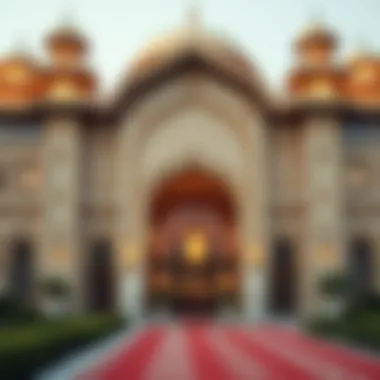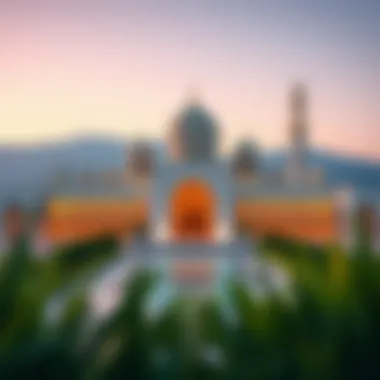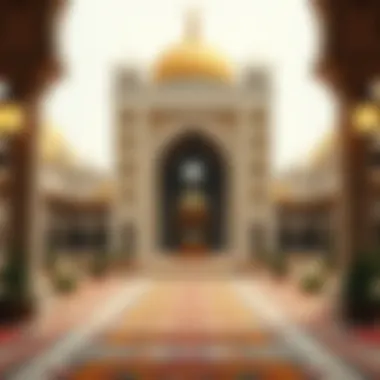Ramadan 2024 Timetable: Key Dates and Insights


Intro
Ramadan stands as a cornerstone of cultural and religious significance for many around the world. As the holy month of fasting approaches in 2024, understanding its framework becomes vital for communities, businesses, and individuals alike. This guide delves into various aspects surrounding the upcoming Ramadan, aiming to illuminate the essential elements that define this special time. From the timing of Suhoor and Iftar to the nourishing traditions that enliven daily life, and the influence on the real estate market in vibrant places like Dubai, every detail is worth noting.
In this exploration, readers will find valuable insights into how the Islamic lunar calendar affects the timetable and daily practices during Ramadan, as well as a look at the cultural practices rooted deeply in these observances. For expatriates and local residents, recognizing these rhythms can also correlate with shifts in the property landscape, impacting both residential and commercial investments.
By enriching this narrative with practical details and cultural context, we aim to prepare readers for how Ramadan may affect their own routines and business practices. With that, let’s first take a closer look at the current trends shaping the market during this notable month.
Market Overview
As Ramadan approaches, the real estate market in Dubai often experiences noticeable changes. Understanding these changes can be beneficial for investors, agents, homebuyers, and managers who are navigating this dynamic scene.
Current Trends
The Ramadan period often sees an uptick in activity within the property sector. Families tend to seek larger, more spacious homes to accommodate gatherings and nightly celebrations. Additionally, as many expatriates and locals alike adjust their schedules around Suhoor and Iftar, understanding this pattern can be crucial when considering property visits or sales.
Developers may launch projects or promotional campaigns during this time, taking advantage of the festive spirit to attract buyers. Moreover, investments in residential properties that are near mosques or community centers often see increased interest, as accessibility becomes a priority. The interplay of spiritual observance and lifestyle demands creates a unique scenario for investors.
Forecast and Predictions
For 2024, analysts predict that the property market will continue reflecting the traditions and engagements of Ramadan. The growing demographics of both expats and locals suggest increased challenges around housing availability. As families expand their search for new dwellings, the competition in certain neighborhoods is expected to rise.
"With the influx of inquiries during Ramadan, it’s essential for real estate professionals to stay agile and responsive to potential buyers’ needs."
The commercial property sector could also see new opportunities. For instance, businesses aiming to cater to Ramadan needs, like catering services or specialized grocery stores selling Iftar essentials, may attract investor interest.
Understanding Ramadan
Understanding Ramadan is vital to appreciating the depth and breadth of this holy month, particularly for those looking to engage with it meaningfully. As the ninth month of the Islamic lunar calendar, Ramadan is not just about fasting; it encompasses a rich tapestry of traditions, personal reflection, and community bonding. For many, it is a time for spiritual refinement, devotion, and social responsibility.
Historical Significance
Ramadan holds immense historical weight for Muslims around the world. It is the month in which the Qur'an, the holy book of Islam, was revealed to the Prophet Muhammad. This event is commemorated through both spiritual practices and teachings. The historical context of Ramadan highlights the unbroken link between the heavens and humanity, serving as a reminder of divine guidance. Understanding this historical significance creates a foundation for how Ramadan is observed today, transforming ordinary practices into sacred rituals.
"The Qur'an was revealed on a night better than a thousand months" (Qur'an 97:3).
This verse highlights the perceived value of this month and the nights it encompasses. The history brings a powerful reverence to the fast, as millions engage not only in abstainment from food and drink but in heightened religious observance. Learning about these roots sheds light on why Ramadan is viewed as the cornerstone of Islamic faith.
Cultural Practices
Cultural practices during Ramadan vary from region to region, showcasing the diversity within the Muslim community. In many Middle Eastern countries, communal Iftar meals – the evening meal that breaks the fast – are common. Families come together, often inviting neighbors and friends, reinforcing bonds and community spirit. In contrast, in regions like Asia, you'll notice unique culinary delights that are specific to local customs.
- In Egypt, people often enjoy a dish called Koshari during Iftar, a beautiful combination of rice, lentils, pasta, and spicy tomato topping.
- In Indonesia, the traditional snack called Kolak, made from bananas and sweet potatoes in coconut milk, is widely enjoyed.
These cultural practices enhance the communal aspect of Ramadan, making the experience shared rather than solitary. The various foods cooked, the prayers said, and the traditions upheld enrich the overall observance and create lasting memories.
The Role of Fasting
Fasting during Ramadan is one of the Five Pillars of Islam, essential for spiritual growth. However, its role extends beyond just abstaining from food and drink. It serves as an exercise in self-discipline, empathy, and contemplation. When Muslims fast, they intentionally experience hunger and thirst, which helps them better understand the struggles of those less fortunate. This role of fasting fosters a sense of compassion and motivates charitable actions, known as Zakat, during the month of Ramadan.
Fasting also encourages a spiritual reset – a chance to focus not merely on the body but on the soul. Engaging in prayers, reading the Qur'an more frequently, and practicing meditation help deepen one's faith and understanding. The fast becomes a metaphorical cleansing of the mind and spirit, reinforcing one's devoutness and sense of community.
In essence, Ramadan encapsulates a lifetime’s worth of lessons in just a month, weaving together ancient traditions with contemporary practices. As we approach the Ramadan timetable for 2024, appreciating these elements will enrich your understanding of the month, making it not just a personal journey but a collective experience.
The Islamic Calendar
The Islamic calendar serves as a pivotal framework for understanding various aspects of the Islamic faith and its cultural practices. This lunar calendar, consisting of twelve months, plays an essential role in guiding the observances associated with significant holidays, including Ramadan. Unlike the Gregorian calendar, which is solar-based and predominantly used in the Western world, the Islamic calendar is rooted in lunar cycles, making its years shorter by approximately eleven days. This is a fundamental consideration for the scheduling of Ramadan dates, as they shift annually within the Gregorian calendar.


Having insight into the Islamic calendar is not merely about knowing dates; it also encapsulates the rhythms of community life and spiritual obligations. For investors and homebuyers in regions with substantial Muslim populations, understanding these rhythms can be crucial. During Ramadan, for instance, market activity may either slow down or intensify, affecting real estate transactions.
Lunar Calendar Overview
The lunar calendar consists of twelve months, each lasting 29 or 30 days, depending on the visibility of the moon. The months include Muharram, Safar, Rabi’ al-Awwal, Rabi’ al-Thani, Jumada al-Awwal, Jumada al-Thani, Rajab, Sha’ban, Ramadan, Shawwal, Dhul-Qi’dah, and Dhul-Hijjah.
- Moon Sighting: The start of each month is determined by the sighting of the new moon. This means that exact dates can vary between countries, depending on local observations or calculations.
- Ramadan's Positioning: Ramadan, being the ninth month, is one of significance, marked by fasting, prayer, and reflection.
- Benefits of Lunar Cycling: One of the benefits of a lunar calendar is that it aligns religious observances with natural cycles of the moon, enhancing the experience of the spiritual journey.
It is essential for members of the Muslim community to adjust their schedules based on this calendar, impacting not just their day-to-day life, but also broader economic activities.
Impact on Ramadan Dates
The shifting nature of the lunar calendar means that Ramadan does not fall on the same date each year. Annually, it can occur approximately ten days earlier than the previous year in the Gregorian schedule. This variability affects various factors:
- Community Engagement: With Ramadan appearing in different seasons, the experience of fasting can range from long, hot days to shorter, cooler ones depending on the climate.
- Business Dynamics: Investors and real estate agents should consider these dates; the increase in communal activities, such as iftar gatherings, can stimulate local economies.
- Real Estate Timing: The first day of Ramadan in 2024 is projected to begin around March 11, subject to moon sighting confirmations. Investors eyeing Dubai's property market should be aware that Ramadan may usher in a unique set of buyer preferences, with more attention on rental properties for expatriates intending to stay during the holy month.
Understanding the Islamic calendar is not just a matter of religious observance; it's essential for navigating cultural and economic landscapes, especially in diverse settings like Dubai where Ramadan dramatically influences daily life and commerce. As such, a careful awareness of these lunar dynamics can provide valuable insights for all stakeholders involved.
The Ramadan Timetable for
Understanding the Ramadan timetable for the year 2024 is crucial for both the faithful and those in various sectors influenced by this holy month. This period marks a time of spiritual reflection, community bonding, and significant lifestyle changes. For expatriates and locals alike, knowing key dates and daily schedules enhances the experience of Ramadan, promoting better preparation for religious observance and social engagement that characterizes this sacred month.
Fasting, prayer, and community gatherings all take on new meaning during Ramadan, making the timetable not just a set of dates but a framework around which daily life revolves. Whether one aims to spend quality time with family or engage in acts of charity, having a clear understanding of the timetable can significantly improve the quality of these experiences. It also plays a role in various sectors such as real estate, tourism, and retail, where changes in habits during Ramadan can affect demand and service delivery.
Key Dates
Ramadan in 2024 is projected to begin on the evening of March 10 and end on the evening of April 9. These dates are contingent on the sighting of the moon, which can vary slightly based on geographical location. Here are a few key dates within this holy month:
- March 10: Start of Ramadan
- March 18: The 8th day of Ramadan
- March 27: The 17th day of Ramadan, known as the Night of Ascension (Laylat al-Miraj)
- April 1: The 22nd day of Ramadan and also the Day of Ghadir
- April 9: End of Ramadan and the commencement of Eid al-Fitr
Each one of these dates can hold different spiritual significance for various communities, and recognizing these can enhance communal participation and celebration.
Daily Suhoor and Iftar Times
Each day during Ramadan starts with Suhoor, the pre-dawn meal, followed by fast until sunset, culminating in Iftar, the meal breaking the fast. Times for both meals vary, providing a daily rhythm that shapes spiritual and social gatherings. For 2024, here is a rough outline of daily Suhoor and Iftar timings:
- Suhoor: Between 4:30 AM to 5:00 AM depending on the level of daylight in your region.
- Iftar: This will generally occur between 6:30 PM to 7:00 PM. The specific timing will depend on the sunset, which varies slightly by location.
It's important for individuals and families to check local prayer guides or community announcements that provide these specific times closer to dates in question to ensure they adhere to the precise timings.
Special Observances
Ramadan is not only a time for fasting but also marked by special observances that deepen the religious endeavors of its participants.
- Laylat al-Qadr: This night, believed to be better than a thousand months, is commemorated within the last ten days and falls on odd-numbered nights. Often many spend the night seeking forgiveness and praying more earnestly.
- Community Iftar Gatherings: Many neighborhoods and mosques arrange for communal Iftars to foster unity and inclusiveness.
- Charity and Zakat: Acts of charity, called Zakat, often increase during this period as many focus on helping the less fortunate.
"Fasting is not just abstaining from food, but an exercise in empathy and self-reflection."
Understanding these aspects of Ramadan can enhance the collective community experience, promoting solidarity and shared values even in diverse urban settings.
For more detailed information regarding the Islamic lunar calendar, you can visit Wikipedia or if you're looking for some community discussions, consider checking Reddit.
Factors Influencing the Timetable
Understanding the various elements that affect the Ramadan timetable is essential for anyone eager to navigate this holy month effectively. From geographical nuances to technological tools, these factors shape not just the fasting times but also the overall experience for both the faithful and the community at large. Readers can glean insights into how these considerations can optimize their observance of Ramadan and enhance connections within their communities.
Geographical Variations


One cannot overstate how geographical factors play a crucial role during Ramadan. Each region, with its unique position on the globe, has distinct hours of daylight, which directly impacts the timing of Suhoor and Iftar. For instance, let’s look at a city like Oslo, Norway, where the sun barely sets during early summer months. Here, Iftar could be observed past midnight, leading to adjustments in meal timings and unique challenges in fasting.
- Latitude Impact: The higher the latitude, the more oscillation in daylight hours throughout the year. This creates a need for adaptive schedules in places like Greenland, where the timing can extend dramatically.
- Cultural Adaptation: Cities with diverse populations, such as London or New York, also see variations. Different communities may follow local mosques’ announcements or adhere to cultural practices that slightly adjust the standard timetable to fit local practices.
- Local Authorities: In some regions, local authorities or Islamic councils assist with determining the exact start and end times based on astronomical calculations. Their proclamations can add layers of complexity to how the timetable is observed in various locales.
Such geographical considerations necessitate not just awareness but also thoughtful planning for anyone hoping to immerse themselves fully in the Ramadan experience.
Technological Aids in Timekeeping
We live in an age where technology can make life simpler in ways that were once unimaginable. For many, particularly busy professionals or expatriates in urban centers, leveraging technological aids for timekeeping during Ramadan is invaluable. Various solutions contribute to precise and personalized observance of Suhoor and Iftar timings.
- Mobile Applications: With countless apps designed specifically for Ramadan, users can quickly access tailored timetables. Apps like 'Muslim Pro' or 'IslamicFinder' offer features that include GPS-based prayer times, adjusting automatically based on user location.
- Web-Based Resources: Websites also provide vital information, listing local prayer times and offering community insights. Reliable platforms can be found through educational institutions or community-focused sites.
- Smart Devices: Smart home devices, such as Amazon Alexa or Google Home, can be set up with reminders for Suhoor and Iftar. This functionality can greatly enhance adherence to the timetable amid busy lives.
Technology thus acts as a bridge between tradition and modernity, making it easier for individuals to maintain their religious obligations seamlessly.
By combining geographical knowledge with cutting-edge technology, Muslims around the globe can experience Ramadan in ways that align with both their faith and lifestyle.
Ramadan in Dubai
Ramadan in Dubai is a month of unique vibrancy and energy, echoing the values and traditions of the Islamic faith. This period brings together a blend of spirituality, community involvement, and cultural heritage. It’s not just a time for fasting; it’s an occasion where individuals come together, re-evaluate their priorities, and engage deeply with their surroundings. For expatriates and locals alike, understanding the nuances of Ramadan in this bustling city holds significant importance.
Community Activities
In Dubai, community activities during Ramadan showcase a blend of religious devotion and social engagement. Places of worship see a spike in attendance, as people gather for prayers, especially during Taraweeh, the nighttime prayer specific to Ramadan. Moreover, iftar gatherings build a spirit of camaraderie. Traditional buffets sprout up across the city, where people from all backgrounds come together to break their fast over a meal.
These activities extend beyond the mosques; community centers often host events that encourage cultural exchange. Programs could include cooking classes focused on traditional Ramadan dishes or seminars discussing various interpretations of the month's significance. Such community cohesiveness fosters mutual respect and understanding. Not only does this enhance the joy of the observance, but it also builds bridges among the diverse populations residing in Dubai.
"The essence of community spirit during Ramadan in Dubai is celebrated not just in the meals shared, but in the relationships nurtured and the understanding fostered across cultures."
Local Traditions
Local traditions around Ramadan in Dubai are steeped in history and cultural significance. For instance, Ghabqa is a well-known evening gathering that takes place shortly after iftar, where friends and families come together to socialize and share delicacies unique to this time of year. The sounds of Darbuka, a traditional drum, often fill the air as artistic performances add to the atmosphere of festivity.
Additionally, many Emirati families take pride in their ability to host elaborate iftar meals, featuring dishes like Harees, Majboos, and date-stuffed pastries. Each meal is an opportunity to showcase the rich culinary heritage and to uphold the practice of hospitality, which is vital in Arab culture.
As the sun sets, families often share stories and reflections on the month’s progress, reinforcing bonds and strengthening moral lessons rooted in Islamic teachings. This tradition is not merely about sustenance; it's about nourishing the soul and reaffirming one's connection to faith and community.
With these traditions playing a critical role in the lives of communities in Dubai, understanding and participating in these customs offers deeper insights into the local culture, particularly for those living or investing in the region's vibrant property market.
In summary, Ramadan in Dubai serves as a powerful reminder of the values of empathy, togetherness, and cultural appreciation. As the month unfolds, it intertwines personal growth with communal enrichment, making it an integral facet of life in this dynamic city.
Real Estate Considerations
When it comes to Ramadan, the implications extend beyond religious observance into various spheres of daily life, particularly in the realm of real estate. For investors, agents, and homebuyers, understanding the nuances of the real estate market during this holy month is crucial. The dynamics shift as many communities engage in different activities, making it a significant period for real estate considerations.
The intertwining of cultural practices with property dealings presents both opportunities and challenges. As people are more focused on their spiritual commitments, the buying and selling trends can fluctuate. Some may hold off on transactions, believing it's not the best time for major decisions, while others see Ramadan as an opportunity, especially if they cater to religious needs or demographics that thrive during this time.
Moreover, the need for shorter leases and more flexible terms might arise. Temporary accommodations could see a spike as many people come to Dubai for Ramadan festivities and family gatherings. All this suggests that understanding the real estate climate can provide an edge for those willing to navigate it wisely. Keeping track of market trends, housing demands, and rental agreements becomes paramount.
Market Trends During Ramadan
The trend analysis during Ramadan reveals a complex picture laden with unique characteristics. Generally, during the month of fasting, you can see a dip in property purchases, largely attributed to the focus on personal piety and family gatherings rather than real estate investments. However, a surge in short-term rentals and hospitality properties often materializes, especially in areas with vibrant community ties or near mosques.
Families looking for larger accommodations or temporary housing while hosting relatives can drive demand for bigger rental units. Moreover, some property owners might lower their rents to attract tenants who are celebrating Ramadan together, creating a competitive yet favorable atmosphere for renters.
- Increased Demand: Temporary space for families and expatriates visiting Dubai.
- Short-term Rentals: Focus on vacation homes or accommodations that cater to larger groups.
- Market Shifts: Observe that sales typically slow down but rentals might increase.
Tips for Observance


Observing Ramadan is more than just fasting; it’s a time for reflection, growth, and connection. Therefore, understanding how to navigate this sacred month can significantly enhance one’s experience, especially for those in the vibrant settings of cities like Dubai where community and culture intertwine. This section shares crucial elements to consider, emphasizing the benefits of planning and preparing for both the spiritual and practical aspects of Ramadan.
Health and Well-being
Maintaining health during Ramadan can be a bit of a juggling act. As the sun rises and sets, one must balance nutritional needs with spiritual commitments. Here are some key tips:
- Stay Hydrated: The struggle is real, especially in warm climates. To keep hydration levels up, consider drinking plenty of water during non-fasting hours. Aim for at least 2 liters before dawn to get the body prepared for the day.
- Nutrient-rich Suhoor: When planning your pre-dawn meal, focus on foods that are high in fiber and protein, as these help sustain energy levels throughout the day. Think of oatmeal, eggs, or yogurt paired with fruits as a great start.
- Balanced Iftar: Break your fast with a combination of simple and complex carbohydrates. Dates are tradition, but pair them with lean proteins, such as grilled chicken or fish, and vegetable-rich dishes to replenish lost energy without overindulging.
- Light Exercise: While diving into a gym routine may be tempting, light activities like walking or stretching can boost energy without exhausting the body. It's all about striking the right balance.
"Health is a state of complete harmony of the body, mind, and spirit."
Understanding these elements not only supports physical health but also enhances the spiritual experience of Ramadan.
Practical Advice for Expatriates
For expatriates, embracing Ramadan can be an enriching yet challenging experience. As traditions might differ from what they've known, here are a few practical pointers:
- Engage with the Community: Connecting with locals or other expatriates can provide support and insights. Join community iftar events, as these gatherings can deepen understanding and forge friendships.
- Cultural Sensitivity: Be aware that this month holds profound significance. Showing respect through gestures, such as wishing others a peaceful Ramadan, can foster goodwill and camaraderie.
- Workplace Considerations: It's vital to discuss expectations with your employer. Many companies adjust hours to accommodate fasting. Knowing your rights and responsibilities will ease transitions.
- Grocery Shopping: As markets stock up for the month, shopping early can help avoid the last-minute rush. Familiarize yourself with traditional foods that may not be readily available throughout the year.
- Plan for Days Off: Understand which days may present challenges due to observance. Planning allows expatriates to manage responsibilities while respecting the cultural significance of these days.
In summary, knowing how to observe Ramadan with intention can turn a routine into a journey of insight and community, regardless of where one lives. By continually adapting, connecting, and reflecting during Ramadan, expatriates can find deeper fulfillment during this sacred time.
Preparing for Ramadan
As the holy month of Ramadan approaches, the focus shifts toward preparation, making the transition into this sacred period smoother and more fulfilling. Preparing for Ramadan is crucial, highlighting both practical and spiritual aspects that pave the way for a month of reflection, community, and devotion.
One key component is planning meals effectively. Between dawn's Suhoor and sunset's Iftar, it’s essential to ensure that every bite is nourishing and satisfying. A well-thought-out menu not only aids in maintaining energy levels throughout the day but also enriches the communal experience of breaking fast with family and friends. The combination of hearty grains, fruits, and protein sources ensures that individuals feel rejuvenated rather than fatigued.
Planning Meals
Meal planning during Ramadan can transform the fasting experience into something exceptional. Allocating time to gather ingredients and try out new dishes caters to dietary needs and cultural preferences. Here’s how to make it impactful:
- Incorporate Variety: Offer a blend of traditional and contemporary dishes. From dates and savory samosas to hearty lentil soups, diversity brings excitement to both Suhoor and Iftar.
- Timing Considerations: Preparing meals ahead of time means no last-minute rush. Many families find it useful to cook in batches, allowing them to focus more on spiritual practices during Ramadan.
- Healthy Choices: Prioritize nutrient-rich foods that provide sustained energy, such as oats, whole grains, fruits, and legumes. On the other hand, curb the temptation for overly processed or sugary options which can lead to sluggishness.
- Gathering Ingredients: Having a well-stocked pantry can alleviate frenzied grocery runs as the month progresses. Plan shopping trips to specified local markets or stores well in advance, taking note of any special items that might be hard to find as the month approaches.
Additionally, the communal aspect of eating during Ramadan lends itself to creating memories. Families often gather to share meals, reinforcing connections and instilling a sense of unity.
Setting Mindsets and Goals
Beyond the tangible aspects of meal preparation, setting mindsets and goals for Ramadan is also vital. This month is not just about abstaining from food and drink; it’s about purifying one's heart and mind as well.
- Spiritual Objectives: Aim to deepen your understanding of faith, perhaps committing to read more religious texts or participate in communal prayers. Reflect on how these spiritual goals can enrich your life and build stronger ties with your community.
- Personal Development: Each individual can set personal benchmarks. This might mean establishing a daily routine that includes time for meditation or personal reflection. Focus on the intent—it's less about perfection and more about progress.
- Community Engagement: Consider volunteering or supporting charitable causes during this time. Giving back fosters a strong sense of community and reminds us of the blessings we hold.
- Reevaluate Life Goals: Use this period to contemplate long-term aspirations, whether personal or professional. Each day is a fresh opportunity to realign oneself towards achieving those dreams.
In summary, the essence of preparing for Ramadan lays in striking a balance between physical needs and spiritual growth. This preparation enables both individuals and communities to fully embrace the holy month, leading to deeper reflections and a more enriching experience overall.
Finale and Reflections
In the context of this comprehensive guide, the section on conclusion and reflections serves as a vital summation of the key elements discussed throughout the article. It ties together the understanding of Ramadan's significance, particularly in 2024, while drawing attention to its rich cultural tapestry and its operational impacts on various aspects, including daily life and the real estate market in Dubai.
The importance of this section lies not only in its capacity to encapsulate the previous discussions but also in offering a moment of pause. Readers are encouraged to reflect on what the observance of Ramadan truly entails—beyond fasting, it encompasses a broader ethos of community, charity, and spiritual growth that resonates widely across diverse backgrounds.
By understanding the dynamics of the Ramadan timetable, individuals can better prepare both mentally and physically for this holy month. Moreover, the reflections shared here can enhance empathy and awareness among non-Muslims who may wish to partake in or support their Muslim friends and colleagues during this period.
Embracing Final Thoughts
As Ramadan approaches, there’s a unique atmosphere that envelops communities. This time signifies much more than mere fasting from dawn until dusk. It is a period of self-reflection, patience, and compassion.
- Cultural Insights: One key takeaway is recognizing the cultural practices that accompany these traditions. Engaging in communal iftars fosters a sense of belonging and encourages sharing, which is especially beneficial in multicultural settings like Dubai.
- Practical Considerations: For investors, homebuyers, and professionals in the market, understanding the shift in daily life dynamics during Ramadan is crucial. Businesses may notice altered hours, while the demand for real estate can experience fluctuations due to the population's emphasis on family gatherings and local traditions.
- Overall Benefits: The reflections on Ramadan cultivate an appreciation for the resilience and unity displayed during the month. As such, they remind us that the values of charity and understanding aren't confined to religious observance— they resonate with a universal sense of togetherness.
Ultimately, embracing these final thoughts cultivates a deeper appreciation for the intricate layers of the Ramadan experience. This month offers an invaluable opportunity to connect with oneself and others, urging us to carry forward these learnings throughout the year.
“Fasting is a shield; it will protect you from the hellfire and prevent you from sins.” – Prophet Muhammad (peace be upon him)
By taking the time to nurture these reflections, the readers can enrich their lives and possibly inspire others to do the same. For further reading, consider checking resources like Wikipedia or Britannica.
Engaging with the community and celebrating the diverse methods of observance not only enhances personal experience but enriches the societal fabric as well.







